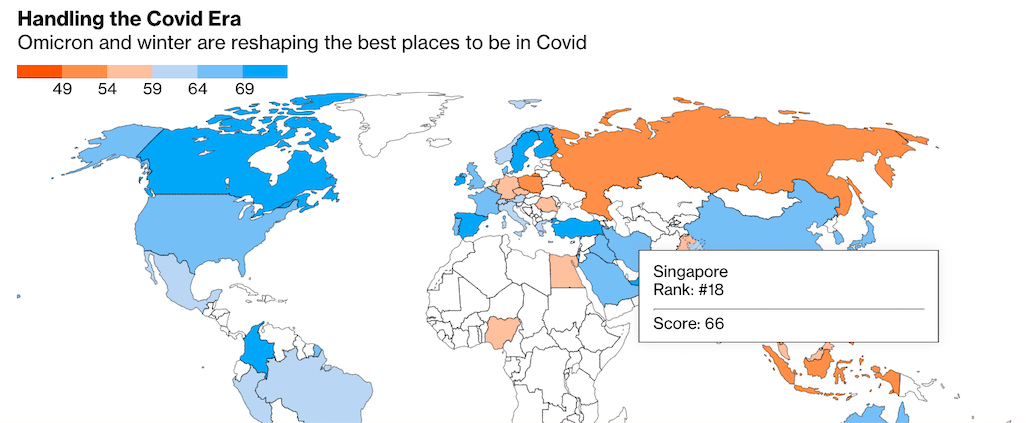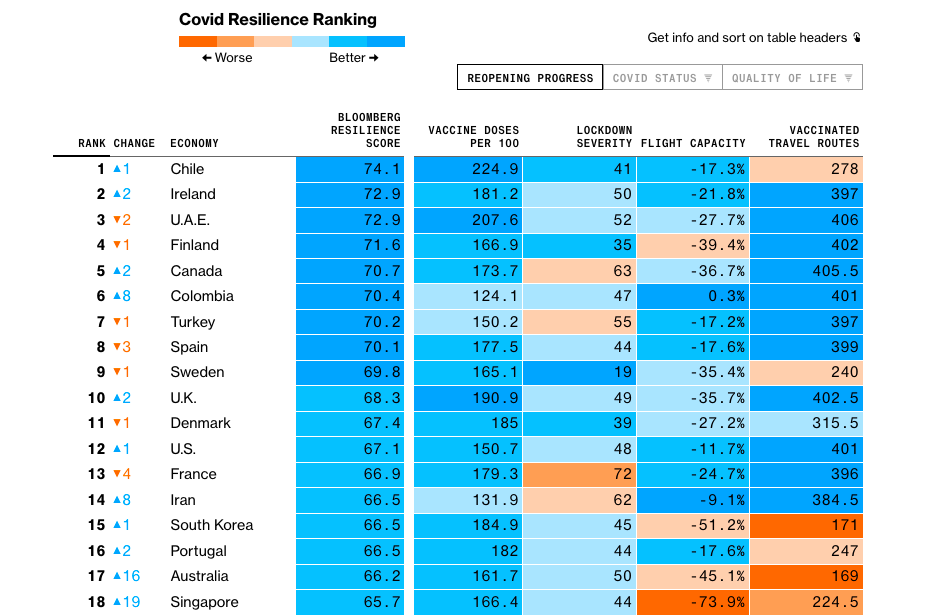Singapore — On Bloomberg’s latest Covid Resilience Ranking, Singapore has vaulted up 19 spots because of a sharp drop in new infections since November, coupled with smaller hospital caseloads as the transition to “living with Covid” goes forward.
It’s been a roller-coaster year for the Republic. In April this year, Bloomberg declared Singapore “the world’s best place to be during Covid”. That didn’t last.
A scant six months later, the Republic’s ranking had plummeted to 39th, its lowest yet, amid record-high Covid infections and deaths. Back then, Bloomberg noted that Singapore had fallen 20 places and that 39th was the lowest that a former top-ranked country had sunk to.
Then came the slow but steady turnaround. In the latest list, published on Wednesday, Singapore shimmied up 19 spots and is now ranked the 18th most resilient country.

Bloomberg provides a “monthly snapshot of where the virus is being handled the most effectively with the least social and economic upheaval”. Its data indicators take into account virus containment, quality of healthcare, vaccination coverage, overall mortality and progress toward restarting travel, and “captures how the world’s biggest 53 economies are responding to the same once-in-a-generation threat”.

This month, with the ebbing of a deadly surge of Delta variant infections, the number of fresh infections and hospitalisations in Singapore went down, and with crucial numbers sliding came the relaxation of social safety measures and border restrictions.

On Dec 1, the Ministry of Health (MOH) reported 1,324 new infections. By Dec 23, this number had fallen to 335. Similarly, from 75 people under intensive care on Nov 12, that number also plunged to 23, based on the most recent data.
The load on the health care system has finally lightened, with hospitalisations falling by 72 per cent.
“Singapore, a former No. 1 on the Ranking in April 2020, now seems to have found an equilibrium of relatively open travel while maintaining conservative measures domestically. Quarantine-free travel is allowed to 24 destinations, including the U.S. and many parts of Europe and Asia, giving a boost to its trade-reliant economy, but residents can’t gather in bigger groups than five locally and entertainment options remain limited,” wrote Bloomberg’s Faris Moktar in a Dec 23 commentary on Singapore’s big leap up the Covid Resilience Ranking.
However, the highly transmissible Omicron variant continues to threaten any progress made by countries all over the globe, including Singapore, especially in the area of travel.
From Dec 23 until Jan 20, 2022, all new ticket sales for vaccinated travel lane (VTL) flights and bus journeys will be suspended, said the MOH.
“To limit our exposure to imported Omicron cases, we will impose limits on the number of VTL arrivals for the time being,” the ministry announced on Wednesday (Dec 22).
In addition to freezing new ticket sales on the said dates, the authorities are also cutting back temporarily on VTL quotas and ticket sales for travel after Jan 20, 2022.
Bloomberg’s Faris Mokhtar commented that Singapore’s high vaccination rate “puts it in good stead to manage a new surge.”
Singapore has vaccinated 88 per cent of its total population (94 per cent of eligible population), with 35 per cent of the total population having received booster shots, per MOH data.
In addition, vaccination bookings for children aged five to 11 are being rolled out progressively.
Vaccinations for children in Primary 4, 5 and 6 can be booked from Dec 22. Children born between 2009 and 2012 can be registered from Dec 27, and those who will be in Primary 1, 2 and 3, from January 2022.
Faris Mokhtar thinks Singapore has a chance to “accomplish an unprecedented feat: treating the virus as a normal facet of life without overwhelming its health care system or triggering the waves of death that occurred in many other places”. /TISG
Wins & Losses: Singapore goes from 1st to 39th in Covid Resilience Ranking, but economy is on track

